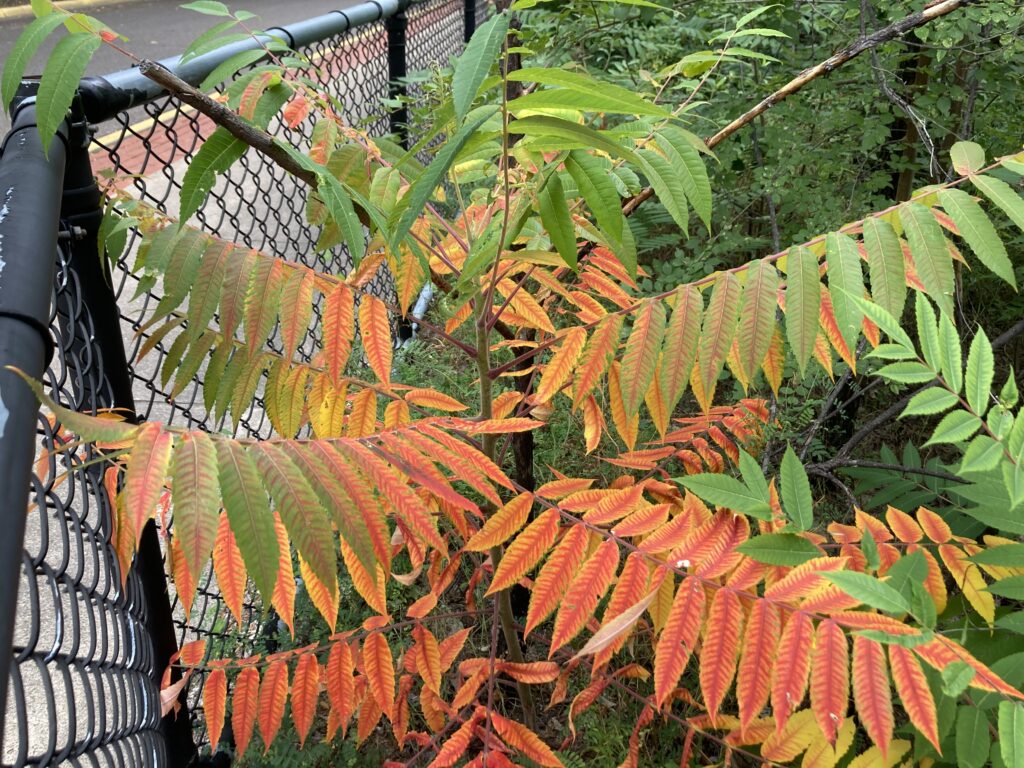5 miles
franklin loop
70 degrees
I was planning to bike over to the lake and swim this morning but it looked gloomy and ominous, and then started raining and thundering for several hours. Bummer. By the time it stopped raining it had warmed up and the sun came out. Even so, I went for a hot and humid run. Everything was wet. A slick trail, dripping branches, wet shoes and shirt.
10 Things
- someone covered over the graffiti on the steps that read, stop hate, with blue paint
- sky, part 1: gray, heavy
- sky, part 2; blue and cloudless
- empty river
- white foam on the edge of the east bank near the franklin bridge
- kids laughing on the playground at the church daycare
- some orange and red leaves beyond the fence near east river road
- the squeal of tires near the trestle — what happened?
- orange cones lining the path: there must have been a race or a sponsored bike ride this past weekend
- the sliding bench was empty of people but close to a thick veil or green
Listened to voices, cars, and drips for the first half of the run, my “Doin’ Time” playlist for the second half. The song I remember the most was Peter Gabriel’s “Playing for Time.”
Oh, there’s a hill that we must climb
Climb through all the mist of time
It’s all in here what we’ve been through
Not a fan of the phrase, mist of time, but these lyrics reminded me of a few lines from Mary Oliver that I read right before heading out for my run:
Slowly
up the hill,
like a thicket of white flowers,
forever.
(The Leaf and the Cloud/ Mary Oliver)
The lines just preceding these were a series of good-byes to the world: the swaying trees, the black triangles of the winter sea, oranges, the fox sparrow, blue-winged teal, lettuce, turnip, rice fields, the morning light, and the goldfinches.
Down, I’m getting it down
Sorting it out
So everything I care about
Is held in here
All of those I love, inside
Listening to these lines, I thought about Oliver’s deepening of the spirit. I thought about the interior and moving inside of yourself and of burying memories and ideas not as a way to avoid them, but to protect them. I also thought about someone growing older and having memory-loss and trying to hold onto faces and names and experiences. I weighed the possibilities and limitations of going deep inside as compared to opening up to the outside. All of these thoughts came at once — not in a linear progression — in a burst which lasted until I heard these lines less than a minute later:
There goes the sun
Back from where it came
The young move to the center
The mom and dad, the frame
I just remembered: at the start of my run, I was thinking about the difference between ordinary and extraordinary time, which was a continuation of thoughts that began earlier this morning. Habits, routines, activities/events experienced again and again — the mundane — versus the scattered, sporadic occasions that break up the routine. While meaning and memories are often found in the singular moments, I’m drawn to the rituals and repetitions and daily events as where imporant meaning dwells.
Everyday. everyday = ordinary / every day = each day, daily.
Everyday—I have work to do (“Work” in The Leaf and the Cloud/ Mary Oliver)
I love that she writes everyday and not every day, so it’s not, each day I have work to do but, ordinary, everyday life: don’t bug me, I have work to do!
bike: 7.5 miles
lake nokomis and back*
75/71 degrees
*instead of the river road trail, we took 44th until the falls park, which is shorter
A good bike ride with Scott. As usual, better on the way back — easier, more relaxed. On the way there: wind. No problems with panicking about not seeing. The ride home was great: the sun was setting soon. Passed by adults playing soccer or flag football or some team sport in the field by the duck bridge, and kids playing soccer at Hiawatha school. RJP and FWA both played for a season at Hiawatha. I played for 5 or 6 years when I was kid in Northern Virginia. I loved it; they didn’t.
swim: 2 loops
lake nokomis main beach
74 degrees
Only 4 other people in the lake, and none of them were swimming laps, just standing around and talking — brrr, I bet that was cold! I swam far from the white buoys and almost completely avoided the milfoil. Only a few times, I got too close and felt the vines on my toes and wrists. For most of the swim there was wind and choppy water. In one direction, it pushed me along. In the other, I got to swim straight into it, which I liked doing. Mostly, a fun swim. The vines were the only bad thing about it. They were too thick by the one buoy so I didn’t want to circle around it. This made it much harder to loop, so I mostly stopped and twisted around. I noticed some birds in the sky and a few planes. Trees on the distant shore were looking less green — were any of them changing?
I thought about how this might be my final swim of the season. It’s cooler for the rest of the week — highs in the 60s, so they might take down the buoys soon. It’s been a great season. I swam for longer, both distance and time. And, I had fun reciting more water lines in my head and writing about water.

